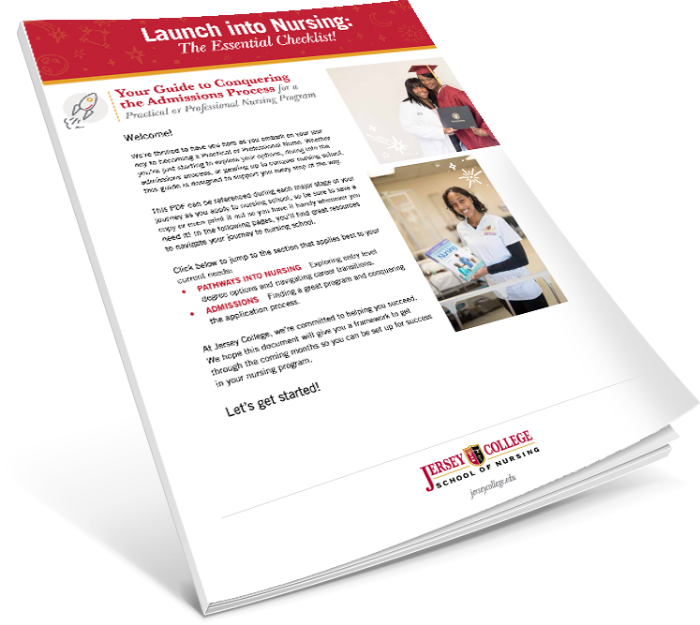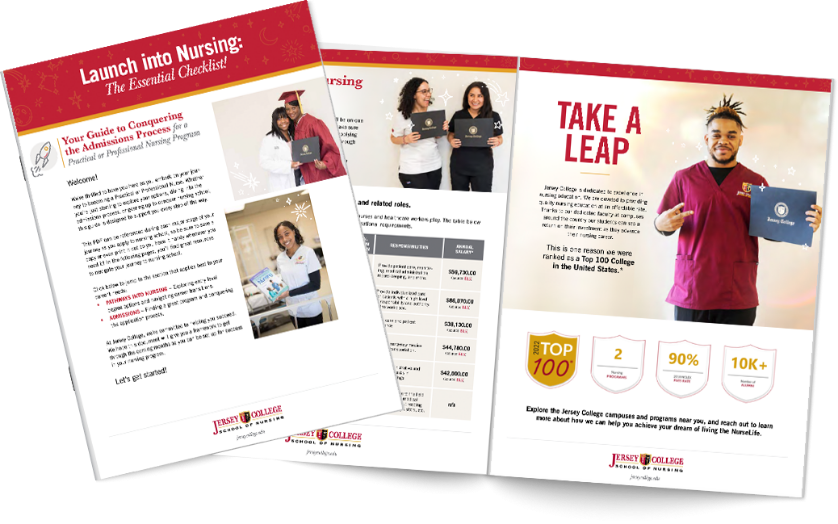
How to Transition from Military Medic to Civilian Nurse
It’s no surprise that professional nursing is a popular career choice for many military medics. Given the vast knowledge and valuable skills gained in the field, applying them in civilian life can be a great transition.
Continuing from military medic to RN studies is a wise and well-suited pursuit. That said, this career path is not without its challenges. By anticipating the most common obstacles faced by veteran nursing students, we can help you smoothly and efficiently transition from military medic to registered nurse.
Jersey College offers multiple nursing programs, each designed to help students achieve their unique objectives.
Here are the most important considerations for moving from a role as a military medic to an RN and developing long-term career goals.
Military Nursing vs. Civilian Nursing
While there certainly are differences between military and civilian nursing, the training and experience acquired in the field can make the transition from military medic to RN student easier. Many of the qualities that make a good military medic are highly transferable to succeeding as a registered nurse.
Some of the most advantageous qualities often held by individuals who opt for the military medic to RN career path include:
- Unwavering professionalism with the ability to stay calm under pressure.
- Punctuality, practice, and comfort with operating in a fast-paced setting.
- A solid understanding of life-saving techniques and a firm foundation of routine healthcare practices.
- Highly adaptable, collaborative team players who are skilled at following precise orders and detailed instructions.
- Strong, proactive leaders with proven time management skills.
4 Tips for a Successful Transition
For a more successful transition from military medic to RN studies, consider the following steps and tips:
- Thoroughly research the requirements, curriculum, and future careers for each nursing program under consideration.
- Evaluate personal needs and future career goals.
- Apply established teamwork skills to recreational and educational activities wherever possible.
- Pursue professional advice, assistance, and other student resources offered at your nursing school or from other institutions and organizations available to you.
Overall, military medics tend to make incredible assets for civilian medical healthcare teams. It’s important, though, to know what the two nursing fields share and what sets them apart to more successfully adjust from the norms of a military medic to RN life.

FREE Essential Guide to Nursing School: Get Accepted, Survive, and Thrive!
Finding the Right Program
Prior to making any decisions, it’s imperative to first evaluate various nursing school and program options to properly determine which direction and coursework will be best.
It may also be helpful to consider the following inquiries:
- What program length are you prepared to commit to?
- Do you currently meet the entry requirements? If not, what are the next steps?
- What are the associated costs for each nursing school program? And what additional resources exist to assist active military members and veterans?
- What career path sounds most fulfilling to you? And will this coursework provide adequate preparation for the specific desired profession?
Assessing these questions early on will help prospective students make the smartest educational decisions in their military medic to RN journey.
Benefits of Becoming an RN
One upside to continuing with nursing school after serving as a military medic is the range of benefits available to make higher education more accessible for veterans.
From financial aid options for those who qualify like federal grants to the targeted application of GI Bill® funds, various provisions may be available to make the educational pursuits of veterans more feasible and less daunting to attain.
Veteran Benefits are designed to reduce the financial burden on students who have served in the military, and a wealth of resources exist to ease the transition from military medic to RN studies. Eligibility is determined by several factors, and benefits may be limited to certain campus locations.
Visit the Jersey College Financial Aid page or speak with a representative for more information on making this career goal more affordable and attainable.

Sign up to get new articles in your inbox and stay updated on our nursing programs.
Jersey College RN Programs
Among the different programs offered at Jersey College, the Registered Nurse pathway can be most beneficial for advancing from a role as a military medic to RN certification.
The Jersey College RN Program for Professional Nursing was created to give future nurses the necessary competencies to fully prepare them for successful careers as licensed healthcare professionals.
The first step is to request more information using our form. Then, one of our admissions representatives can help guide you through the application process. Some of our application qualifications include:
- Ages 18 or older
- High school completion (or equivalent)
- A permanent resident card or proof of US citizenship
- Completing an applicant interview
Coursework for the RN program includes relevant medical curricula and data plus a range of complementary classes like health and life sciences to give students a reliable, rounded education in the diverse and demanding requirements of the appropriate nursing professions.
Upon completion of the RN Program, students will receive an Associate’s Degree and be eligible to obtain licensure and embark on their new paths as civilian registered nurses.
Additional programs and options include Practical Nursing (LPN) and a “Bridge” program to support students wishing to advance from LPN to RN licensure eligibility. Each program or program option is designed to provide a comprehensive education for the specific career outcomes being pursued. Find your local campus to see what programs are available to you.
Get Started
When considering the most practical strategies for transitioning from a position as a military medic to RN professional, there are several distinctions and common challenges to be aware of.
For many reasons, military medics make excellent candidates to become registered nurses, building on a variety of existing strengths and invaluable experience and learning how best to apply them professionally for ongoing job satisfaction and success.
The following additional resources may be useful in determining the most appropriate next steps:
Contact a Jersey College representative for more information and to further explore this important next step in your career.
Find Your Campus
Based on the success of our programs, we have grown to serve communities in 7 states (and counting!). Find a campus near you to start your NurseLife.

FREE Essential Guide to Nursing School: Get Accepted, Survive, and Thrive!
